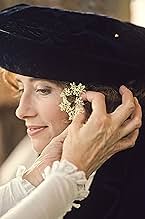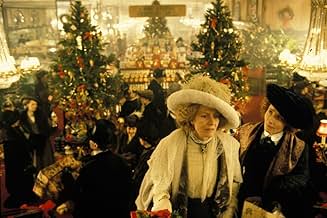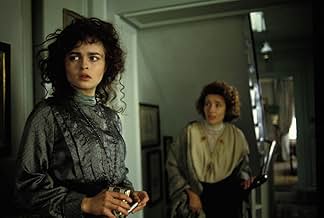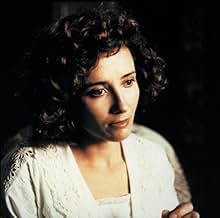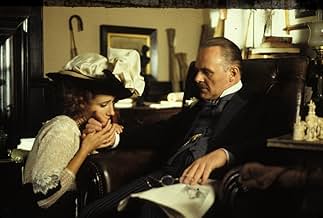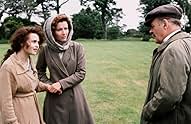NOTE IMDb
7,4/10
38 k
MA NOTE
Un homme d'affaires contrecarre le legs d'une demeure fait par sa femme à une autre femme.Un homme d'affaires contrecarre le legs d'une demeure fait par sa femme à une autre femme.Un homme d'affaires contrecarre le legs d'une demeure fait par sa femme à une autre femme.
- Réalisation
- Scénario
- Casting principal
- Récompensé par 3 Oscars
- 32 victoires et 49 nominations au total
Avis à la une
Howard's End is not an easy movie to sit through if you do not typically watch period films. The language and euphemisms are very old fashioned (1910). But if you really sit back and watch the story unfold you will become engrossed. The crafting of the story by Merchant Ivory is impeccable. They tell the story so visually that you may not notice how physically alike Margaret Schlegel is to Ruth Wilcox in carriage and deportment, but the light-bulb goes off when the housekeeper of Howard's End mistakes Margaret for Ruth. The story itself is so quiet and brilliant that you don't realize something so very profound has happened until the credits roll. Every performance is amazing, but Emma Thompson (she won the Best Actress Oscar) and Vanessa Redgrave stand out. Their scenes together are so full of nuances that it's hard to take it all in during a first viewing.
I'm sure that even in 1910 when Kaiser Wilhelm still had a few fans who remembered he was the grandson of Queen Victoria and not ruler of the soon to be hated foe of World War I, E.M. Forster must have come in for a few critic's slings in having some of his protagonists of Howards End have a German surname. Even that early time there were many who saw Germany as a potential foe.
These two Schlegel sisters played by Emma Thompson and Helena Bonham Carter befriend the Wilcoxes, a family of newly rich plutocrats headed by Anthony Hopkins who seem to be a version of Lillian Hellman's the Hubbards lite. Their mother is the class of the family and she's played by Vanessa Redgrave who is in poor health.
While Bonham-Carter is rejected by Hopkins's son James Wilby as a suitable wife for marriage, Vanessa befriends Thompson finding her to be a kindred intellectual spirit in a house full of moneygrubbers. In fact before she dies she writes an unsigned note asking that a cottage that's in her family's name called Howards End be given to the Schlegel sisters. When Hopkins and the rest of the family find the note after she's dead it gets torn up and burned. Unsigned it has no probative value in any event.
But as fate would have it Thompson and Hopkins get into a relationship and they soon marry and she tries to polish some of the rough edges off him. Especially in regard to snobbery. Hopkins is the kind of man who wants no reminders of where he came from. Particularly with another of the Schlegel sisters friends, a young clerk named Leonard Bast played by Samuel West trying to make his way in the world as the Wilcoxes have.
Emma Thompson won the Academy Award for Best Actress for Howards End that year and the film also won Oscars for Art&Set Direction and for adapted screenplay. Though Thompson won the Oscar, my absolute favorite in this film is Susie Lindeman as Mrs. Dolly Bast. She's so incredibly common and obviously holding him back, you can't blame West for eventually getting involved with Bonham-Carter which leads to tragedy.
The team of Ismail Merchant producer and James Ivory director succeed again at bringing the look and manners of Edwardian England as seen by E.M. Forster to life. Who says they don't make literate films any more, whoever says that have them see Howards End.
These two Schlegel sisters played by Emma Thompson and Helena Bonham Carter befriend the Wilcoxes, a family of newly rich plutocrats headed by Anthony Hopkins who seem to be a version of Lillian Hellman's the Hubbards lite. Their mother is the class of the family and she's played by Vanessa Redgrave who is in poor health.
While Bonham-Carter is rejected by Hopkins's son James Wilby as a suitable wife for marriage, Vanessa befriends Thompson finding her to be a kindred intellectual spirit in a house full of moneygrubbers. In fact before she dies she writes an unsigned note asking that a cottage that's in her family's name called Howards End be given to the Schlegel sisters. When Hopkins and the rest of the family find the note after she's dead it gets torn up and burned. Unsigned it has no probative value in any event.
But as fate would have it Thompson and Hopkins get into a relationship and they soon marry and she tries to polish some of the rough edges off him. Especially in regard to snobbery. Hopkins is the kind of man who wants no reminders of where he came from. Particularly with another of the Schlegel sisters friends, a young clerk named Leonard Bast played by Samuel West trying to make his way in the world as the Wilcoxes have.
Emma Thompson won the Academy Award for Best Actress for Howards End that year and the film also won Oscars for Art&Set Direction and for adapted screenplay. Though Thompson won the Oscar, my absolute favorite in this film is Susie Lindeman as Mrs. Dolly Bast. She's so incredibly common and obviously holding him back, you can't blame West for eventually getting involved with Bonham-Carter which leads to tragedy.
The team of Ismail Merchant producer and James Ivory director succeed again at bringing the look and manners of Edwardian England as seen by E.M. Forster to life. Who says they don't make literate films any more, whoever says that have them see Howards End.
10sphinx-7
This is one of my all-time favorite movies. From the opening credits, superimposed over Vanessa Redgrave's skirt sweeping through the wet grass and flowers around Mrs. Wilcox's beloved Howards End, through to the final image of rural bliss, the cinematography is perfection. The costuming is amazing, the screenplay is adept, and the acting is stellar, to say the least. To have Emma Thompson, Helena Bonham Carter, Vanessa Redgrave, and Anthony Hopkins in one movie together is to see a true synthesis of talent, not to mention James Wilby and Samuel West. The scene where Leonard Bast goes walking into the field of blue flowers is breathtaking.
I recommend this film to anyone who loves Forster and who loves painterly cinematography. Also it is full of the finest performances by all of the actors involved.
I recommend this film to anyone who loves Forster and who loves painterly cinematography. Also it is full of the finest performances by all of the actors involved.
...and I must admit that on the first viewing, I didn't get it myself.
I'm one of those relative rarities: a straight male that normally enjoys Merchant-Ivory productions. However, I disliked this movie on first viewing (several years ago). In retrospect, I can see that I was not reacting to the movie, but my intense dislike for Anthony Hopkins' character.
I watched it again the other night and was absolutely blown away by it. What a film! Emma Thompson won Best Actress for her performance, and she did her usual terrific job, but frankly I was more impressed by the performance of Helena Bonham Carter. The style of the film is magnificent.
This is a story (like most of E. M. Forster's) about the injustices of class distinctions. However, with a subtlety that I missed on my first viewing, this film is also about karma (what goes around - comes around) and a story of social progress. This film is set in a time when society is coming out of the Victorian age and into the Edwardian. You see contrasts of the past thinking with the progressive thinking all through the movie. A visual metaphor is repeated over and over: the turning of cranks, whether it be on a new-fangled morse code machine, a vintage car, or the wheels of a mighty locomotive. I believe that this represents both karma and progress, forces which Forster sees as unstoppable as the laws of nature.
This is an incredible story, and an incredible piece of film-making.
I'm one of those relative rarities: a straight male that normally enjoys Merchant-Ivory productions. However, I disliked this movie on first viewing (several years ago). In retrospect, I can see that I was not reacting to the movie, but my intense dislike for Anthony Hopkins' character.
I watched it again the other night and was absolutely blown away by it. What a film! Emma Thompson won Best Actress for her performance, and she did her usual terrific job, but frankly I was more impressed by the performance of Helena Bonham Carter. The style of the film is magnificent.
This is a story (like most of E. M. Forster's) about the injustices of class distinctions. However, with a subtlety that I missed on my first viewing, this film is also about karma (what goes around - comes around) and a story of social progress. This film is set in a time when society is coming out of the Victorian age and into the Edwardian. You see contrasts of the past thinking with the progressive thinking all through the movie. A visual metaphor is repeated over and over: the turning of cranks, whether it be on a new-fangled morse code machine, a vintage car, or the wheels of a mighty locomotive. I believe that this represents both karma and progress, forces which Forster sees as unstoppable as the laws of nature.
This is an incredible story, and an incredible piece of film-making.
The literary period piece is a difficult genre to master, requiring a difficult balancing between restraint and flowing emotion. Few films effectively achieve this as beautifully as Merchant-Ivory's astounding HOWARDS END, making it probably the best period film of the 1990's. The film juxtapositions the intellectual, emotionally unhindered Schlegel sisters against the restrained, imperious Wilcox family, and, for good measure, mixes in the differing attitudes toward class emerging early in the century. What could quite easily have been a dry study in the cultural dynamics of pre-WWI England becomes an enveloping tale, thanks in no small part to the performances by Hopkins, Emma Thompson, and Vanessa Redgrave, whose Ruth Wilcox remains enigmatic after every viewing. The emotions ringing through by film's end - not to mention its astoundingly pointed social criticism - give the film its power, a power missing even from Forster's rambling, distant novel. And this story is nestled amongst some of the most beautiful art direction, music, and cinematography to ever grace the screen. The haunting journey to HOWARDS END is one few other recent films can rival.
Le saviez-vous
- AnecdotesDame Emma Thompson received a total of thirteen nominations for her role in this movie. She won in all of those events, which includes an Oscar, a Golden Globe, and a BAFTA as Best Actress.
- GaffesWhen Charlie and Dolly Wilcox are hiding from Margaret Schlegel in the castle, the scene closes with low angle wide shot of the castle with a view of the sky behind it, revealing an aircraft contrail. There were no aircraft capable of leaving high-altitude contrails in the time period this movie is set in.
- Citations
Margaret Schlegel: Will you forgive her as you yourself have been forgiven... you have had a mistress; I forgave you. My sister has a lover, you drive her from the house. Why can you not be honest for once in your life? Why can't you say what Helen has done, I have done!
Meilleurs choix
Connectez-vous pour évaluer et suivre la liste de favoris afin de recevoir des recommandations personnalisées
- How long is Howards End?Alimenté par Alexa
Détails
- Date de sortie
- Pays d’origine
- Site officiel
- Langues
- Aussi connu sous le nom de
- El fin del juego
- Lieux de tournage
- Fortnum & Mason's, Piccadilly, Mayfair, Westminster, Greater London, Angleterre, Royaume-Uni(where Ruth and Margaret do their Christmas shopping)
- Sociétés de production
- Voir plus de crédits d'entreprise sur IMDbPro
Box-office
- Montant brut aux États-Unis et au Canada
- 26 126 837 $US
- Week-end de sortie aux États-Unis et au Canada
- 52 568 $US
- 15 mars 1992
- Montant brut mondial
- 26 476 514 $US
- Durée2 heures 22 minutes
- Couleur
- Rapport de forme
- 2.39 : 1
Contribuer à cette page
Suggérer une modification ou ajouter du contenu manquant

Lacune principale
What was the official certification given to Retour à Howards End (1992) in Canada?
Répondre



